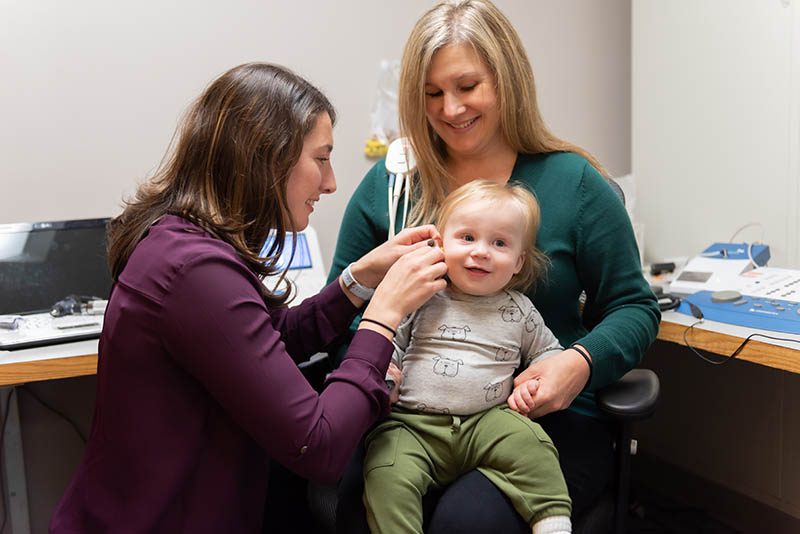Pediatrics
Pediatrics

Your Child’s Hearing Is Among Our Top Priorities
The CDC estimates that hearing loss impacts 1.7 out of every 1,000 babies and 1.4 out of every 1,000 children still in development, making the problem far more prevalent than most people realize.
Your child’s ability to communicate, connect, and interact with the world around them is a critical element in their development. If something isn’t quite right, your peace of mind comes from knowing that your hearing care professional is capable and dedicated to providing the best solutions.
Because hearing is a key element in speech and language development, children are screened for hearing loss shortly after birth, and the results are documented by the Massachusetts Board of Health. However, these screenings do not always “catch” all issues that may cause children to experience hearing loss.
Whether your child struggled to pass their newborn hearing screening or other factors are the cause of your concern, communicating hearing issues with your child’s pediatrician and identifying any potential hearing challenges as early as possible is critical.
The pediatric audiologists at South Shore Hearing Centers have evaluated hundreds of local children, earning the trust of local pediatricians, families, and schools. We provide a full spectrum of hearing healthcare services to children of all ages. We work with families and schools to ensure we are providing full care for each child.
Frequently Asked Questions About Children’s Hearing Loss

How do I recognize signs of hearing loss in my child?
Children’s hearing loss is usually diagnosed during the general testing and screening processes conducted at birth, but some hearing loss doesn’t show up until later on. Consequently, it is necessary to be able to recognize the early signs that your child could be experiencing a problem:
- Failure to react to loud noises
- Doesn’t respond to your voice unless there is eye contact
- Your child makes simple sounds that taper off
- Pulling or rubbing his or her ears
- Ongoing crankiness for no apparent reason
- Stops paying attention when you or someone talks to them
- Frequent or ongoing lethargy
- Failure to understand directions
- Turns up the television or complains that it’s not loud enough
- Fever along with ear pain
Any or a combination of these signs should be cause for concern regarding your child’s hearing and should motivate you to consult with a pediatric hearing care professional.

What are some of the causes of children’s hearing loss?
Potential causes of hearing loss in children include:
- Congenital. Hearing loss at birth can come from genetics, prenatal issues like diabetes or pre-eclampsia, and premature birth.
- Otitis Media. Many children experience a middle ear infection due to inadequate formation of the Eustachian tubes, causing fluid to build up behind the eardrum and become infected. Without adequate treatment, severe and ongoing otitis media can lead to permanent hearing loss.
- Illness, Injury, or Medications. Meningitis, encephalitis, measles, chickenpox, and the flu can lead to the development of hearing loss, as can head injuries, exposure to very loud noise, and some medications.
- Extended NICU stay. Newer protocols are for 5 or more days in the NICU triggers recommendation for hearing testing at 6-8 months old.
How Is Children’s Hearing Loss Treated?
Because hearing loss in children leads to language and other development challenges, doctors of audiology make an extra effort to diagnose and treat it as early as possible.
Otitis media is typically treated using medications to decrease fluid buildup, inflammation, and infection but often calls for the insertion of tubes to allow the fluid to drain, prevent infection, and avoid long-term, permanent damage.
Hearing aids can help children as young as 1 month old when a hearing care professional is able to accurately diagnose and provide the right device. Cochlear implants, reserved for children with severe hearing loss who are not responding to other forms of treatment, are electronic devices placed in the inner ear to help stimulate hearing.
Training in alternative communication, such as lip-reading and sign language, begins as early as possible for children with severe hearing loss in order to limit its impact on their development.


What steps can I take to help deal with my child’s hearing loss?
“Will my child be able to make friends?”,
“Will he or she be able to get a decent education, a job, and a partner?”
These concerns are understandable, as is the fear and anxiety of parents who have children with hearing loss. Here are some steps you can take to help deal with your child’s hearing loss.
- Seek out experienced parents. Other parents have had similar struggles and have found ways to deal with them. Seeking the advice of “experienced” parents can help you and provides your child access to other children with hearing challenges.
- Hold onto dreams and ambitions. Hearing loss doesn’t mean that your child cannot enjoy a happy, rewarding, and successful life with the same opportunities as others.
- Accept, love, and encourage your child. Rather than focusing on their hearing challenges, focus on who they are. Your attitude fosters the confidence your child needs in order to be comfortable taking part in everything life has to offer.
- Empower your child to succeed. Treating your child the same as those without hearing loss prevents them from believing their condition makes them a lesser class of individual.
Reviews
Hear What Our Patients Have To Say
Early Detection Produces Best Results
When it comes to any type of hearing loss, but especially with children, early detection provides audiologists with a broader range of options and a higher likelihood of success.
If you suspect that your child has a hearing problem, contact South Shore Hearing Centers for a thorough and comprehensive hearing evaluation.
"*" indicates required fields







